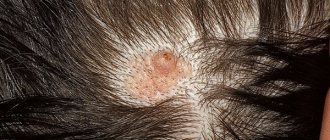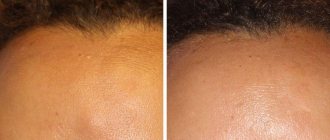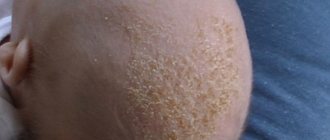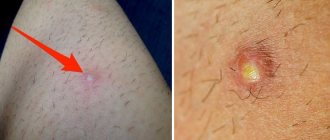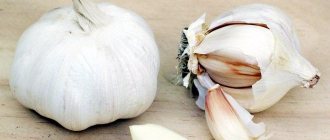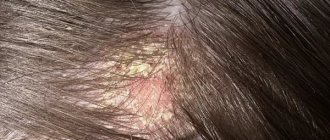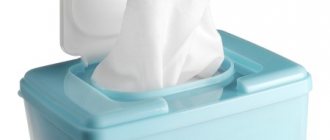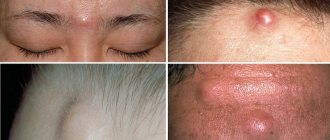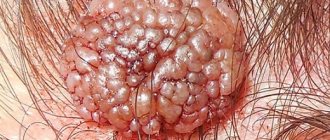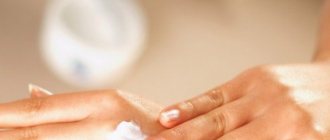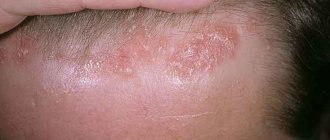Itchy and itchy scalp - the situation often resembles dandruff due to increased dryness of the skin or incipient lice. It is not socially accepted for women with long hair to itch constantly.
Let's look at the causes and treatment of itchy scalp. What to do if your scalp itches after washing, after coloring, for no apparent reason, or in case of illness.
The frontal area, crown and back of the head often itch, hair falls out and headaches occur.
Seborrheic dermatitis
Seborrheic dermatitis is a disease directly related to disruption of the endocrine system. The sebaceous glands begin to work in increased mode, as a result, an excess amount of sebum is produced. It glues dead skin particles together, resulting in the formation of scales on the scalp. In addition, a layer of sebum closes the pores of the skin, as a result of which it cannot “breathe” normally. All this together causes itchy scalp.
The disease can be caused by stress, low immunity, concomitant diseases of the scalp, and hormonal changes. It is most often observed in women during menopause and in adolescents during puberty.
Dandruff
In addition to headache itching, seborrheic dermatitis is accompanied by symptoms such as:
- inflamed scalp;
- dandruff;
- deterioration of hair condition;
- Regardless of the cleanliness of the hair, the roots are always greasy.
To treat the disease, you need to consult a doctor who will help not only eliminate the symptoms, but also determine the cause of the disease.
Causes of itching
Doctors talk about many factors that cause the body to itch at night. Some of them are the most common, others appear extremely rarely. To diagnose the form of your itching, you need to determine the following:
- is it a chronic itch or a one-time itch;
- itching can be localized or general.
Causes of localized itching
Typically, itching of specific parts of the body is associated with some dermatological disease. If you think that your body itches for no reason, you should understand that in most cases this is not the case. There are specific skin pathologies that cause this problem, namely:
- Dry skin. In winter, when it is cold outside and the humidity is as low as possible, the skin dries out much faster. Due to this, the likelihood of injury increases. More often, micro-sized wounds begin to form, which become infected, causing itching.
- Allergy. Localized itching can be caused by local medications, insects, seasonal flowering plants outside the window, clothing, food, pets, household dust, chemicals, etc., which can cause an allergic reaction.
- Insect bite. When it occurs, toxins enter the skin, causing inflammation. One of the signs is itching.
- Presence of parasites. If your head itches much worse at night, there is reason to think about getting it checked. Pinworms, lice, scabies mites and other parasites are more active at night, which can cause increased itching.
- Infectious process in the epidermis, etc.
Why does generalized itching occur?
Many patients suffer from widespread itching in the evening or at night. This may happen for the following reasons:
- liver diseases: hepatitis, hyperbilirubinemia;
- endocrine diseases: diabetes mellitus, thyrotoxicosis;
- oncology;
- neuropsychiatric disorders;
- anemia, polycythemia vera and other blood diseases;
- hereditary xeroderma.
If generalized itching occurs repeatedly, medical attention is required. You should consult a doctor and conduct a complete diagnosis of the body. Sometimes even mild itching can indicate some serious problems in the body that need to be treated immediately.
Allergic reactions
One of the most common causes of an itchy scalp is an allergic reaction. In this case, not only itching is observed, but also redness of the skin, rashes, and sometimes slight swelling. But most often there is no dandruff. Allergies can be caused by:
- Food;
- hair care products (shampoo, conditioner, mask);
- styling products (gels, foams, mousses);
- hair dyes (most often the reaction is caused by the ammonia contained in the composition).
If your head begins to itch and itch after using a new product, you should stop using it and return to the proven one. If the problem occurs after coloring, you can use a neutralizing shampoo, and next time choose ammonia-free paint.
What is the reason for the nocturnal intensification of the symptom?
Itchy skin at night can also be triggered by natural processes that occur with each of us during the period of falling asleep and sleeping:
- as you know, in the evenings the skin temperature rises slightly, as a result of which the production of enzymes in its thickness increases, contributing to the development of discomfort and unpleasant sensations;
- during and immediately before people go to bed, the pain sensitivity threshold decreases, which causes a more acute perception of itching sensations;
- in the dark, the activity of the parasympathetic nervous system, which is responsible for itching at night, increases;
- At night, the skin loses more water than during the daytime, which causes dryness of the epidermis and an increase in the influence of external irritants on them.
Sometimes one of the provoking factors contributes to the fact that the body itches at night. But more often such discomfort is associated with the activation of several processes at once. Only by normalizing the correct daily routine, as well as ensuring a good night's rest, can a person count on eliminating pathological sensations and improving the quality of his life.
Avitaminosis
In some cases, the scalp itches if the body lacks micro- and macroelements or vitamins. In addition to itching, a lack of nutrients is manifested by symptoms such as:
- disruption of the sebaceous glands (lack of vitamin B2);
- hair loss (lack of vitamins A and C);
- slow regeneration of skin cells (insufficient intake of vitamins B6 and E);
- premature skin aging, dryness, flaking (vitamin D deficiency).
With vitamin deficiency, weakness, decreased performance, and frequent colds are often observed.
Diagnostic features
If your whole body itches at night, it is better not to ignore such a symptom, but to seek qualified help from a doctor. As a rule, the problem of itching all over the body, which manifests itself mainly at night, should be dealt with by a specialist in a narrow field of professional activity. Depending on the reasons for the development of the pathological condition (for itching of neurogenic origin - a psychotherapist, for diseases of internal organs - a therapist, for an infectious skin lesion or allergy - a dermatologist, etc.).
Diagnosis of body skin itching at night may include various examinations to determine the true causes of the pathological condition. A more detailed plan is drawn up by the attending physician, based on the clinical features of the disease and the nature of its course.
Skin diseases
An itchy scalp can be a symptom of a serious skin condition. Among them:
- psoriasis is a non-infectious disease, the main symptoms of which are redness and peeling of the skin;
- ringworm is a fungal disease that causes tissue inflammation, accompanied by swelling and the appearance of ulcers;
- focal alopecia - baldness is often accompanied by severe itching of the head;
- xerosis – occurs due to insufficient secretion of the sebaceous glands, resulting in dry skin, peeling, and the appearance of small cracks;
- dermatomycosis - appears due to contact with parasitic fungal microorganisms on the skin;
- folliculitis – inflammation of the hair follicles.
Psoriasis
Skin cancer may be the cause of an itchy scalp.
Preventing itching at night
There are a number of recommendations that, if followed, can significantly reduce the likelihood of developing itching at night. Firstly, this is personal hygiene. In addition, it is recommended to exclude from the diet foods that can cause allergies, as well as those that cause vasodilation. This could be alcohol, tea, spices, coffee, very hot food.
It is recommended to make your life more measured. You should avoid stress, overexertion, anxiety, and maintain a good mood before bed. Excessive nervous tension can cause severe itching at night.
But the best preventive measure is regular diagnostic procedures that allow you to find out the condition of the body. Thanks to constant medical examinations, it is possible to identify the disease at an early stage and cure it as much as possible.
Parasites
Infection with parasites is a fairly common cause of itching. There are several types of insects that parasitize the human scalp:
- lice – cause infection with pediculosis, transmitted through close contact from person to person;
- scabies mites – provoke the development of scabies;
- demodicosis - the development of the disease is provoked by hair mites.
Human fleas that have settled in the hair are a rather rare, but still common reason why the head itches if there are no lice and ticks.
Possible pathologies and disorders
Experts often identify the causes of scalp itching, described below.
Parasite activity
The occurrence of skin itching when infected by parasites is provoked by a person’s allergic reaction to the toxins of the secretions of the pathogenic microorganism (excrement, saliva, glandular secretions).
Scabies and pediculosis
It is possible to detect lice or itches that cause scabies yourself using a magnifying glass with sufficiently strong magnification. Lice look like whitish, translucent and very small insects.
You won't be able to see the ticks themselves with a magnifying glass, but you can see the passages they gnaw under the scalp. To do this, lubricate the suspicious area on the scalp with a cotton swab containing iodine. The loose layer of the epidermis, where the scabies channels pass, is impregnated more intensely, so they become noticeable and look like thin brown (from iodine) scratches - straight or winding.
You should know that, as a rule, scabies itches affect the scalp mainly in children under 4–5 years of age. This phenomenon is not observed in adults. If the baby scratches his head, feet, bottom, back, and his nails begin to peel and crumble, then the itching of the head clearly indicates the development of scabies.
Demodicosis
The tick-borne skin disease caused by glandular acne manifests itself as itching on the face, forehead, chin, external auditory canal, eye irritation and the appearance of rosacea.
To clarify the diagnosis of a parasitic infection (pediculosis, scabies, demodicosis) or to exclude this cause of itching, a bacterioscopy is required, which is performed by a dermatologist or infectious disease specialist.
This video will tell you about the various causes of itchy scalp, dandruff and oily hair:
Scalp diseases
A very common cause of itching is pathologies affecting the scalp. They are usually the easiest to diagnose, and in these cases, itching is not the only sign of the disease.
Xerosis
A condition of abnormally dry skin occurs when there is insufficient secretion of sebum. A burning sensation and itching, redness and peeling develop.
As a rule, there are two reasons:
- use of aggressive chemicals;
- hormonal disorders.
Frequent hair washing, hot air from a hair dryer, the use of straightening devices, and the use of chemical hair treatments for the purpose of permanent curling actively dry out the skin and hair, causing itching.
Psoriasis of the scalp area
This is a non-infectious disease that has many forms, one of which is seborrheic, manifested by the appearance of itchy (but not always) pink convex plaques on the head, covered with dry whitish scales similar to dandruff. They spread from the scalp to the neck and behind the ears.
Dermatophytoses and mycoses
Skin lesions by pathogenic dermatophyte fungi cause very severe itching. To exclude the disease, it is recommended to do a laboratory culture for the fungus. Currently, medicine also classifies seborrhea as a fungal infection.
Seborrheic dermatitis
Often, scratching with seborrhea is accompanied by peeling, “falling off” of skin scales, the appearance of which is called dandruff. This results in debilitating itching of the head.
The disease is associated with a disorder of the functions of the glands that produce sebaceous secretions or with damage to the scalp by a fungus. Dry seborrhea occurs due to glandular deficiency, while oily seborrhea occurs due to the active secretion of skin secretions, the chemical composition of which is disturbed.
If you try to eliminate the itching without proper treatment of chronic seborrhea, this condition can develop into a more serious pathology - seborrheic eczema.
Ringworm
An extremely unpleasant fungal skin disease, more common among children in close groups or in contact with animals.
The main symptoms that may indicate ringworm are the appearance of itchy, flaky, inflamed plaques with remnants of broken hair on the skin under the hair. Bald spots swell, become covered with purulent discharge and then with a thick crust, grow and invade other areas of the body.
Dermatomycosis
Damage to the scalp by fungi of the genus Microsporum and trichophytes endothrix is manifested by a pronounced sensation of itching, hair fragility, which is caused by the growth of parasites in the hair shaft, and hair loss after suppuration and destruction of the follicles.
Ailments of internal organs and general pathologies
The head itches not only with skin diseases, but also with pathologies of internal organs and systems, disruption of hidden processes in the body and disorders of the nervous system.
Failure to comply with hygiene rules
Irresponsible attitude towards hygiene rules is also a fairly common cause of itching of the head and neck. Dirt, oily, greasy hair and skin, particles of styling products remaining on the skin - all this provokes a deterioration in the condition of the skin. If your head itches, but there are no lice or allergies, then perhaps you should try the simplest treatment - start washing your hair regularly.
The problem can be caused not only by insufficient hygiene, but also by improper care. Dealing with this is also not difficult, you just need to use care products suitable for your hair type.
Mechanical damage
If your head itches, but it is clean and there are no parasites, it is worth checking for mechanical damage to the skin. The burning sensation may be caused by a fresh scratch or cut.
For many people, the process of tissue regeneration is accompanied by itching (in people with hypersensitivity it can be very severe), so the skin may itch and itch as existing wounds or abrasions on the head begin to heal. You should not scratch them, this will slow down the healing process. In addition, you can introduce an infection into the wound. To relieve unpleasant symptoms, it is enough to use soothing itching and accelerating healing agents.
Why does your head itch and how to get rid of itching?
Perhaps you just didn't wash out the shampoo well, and this caused skin irritation.
Or maybe itching and a rash on the head are signs of allergic contact dermatitis. It is common among people who dye their hair.
You may also be allergic to shampoo, conditioner, or any other hair product. To check your suspicions, simply apply the substance to the crook of your elbow. If a rash appears there, then your fears are not in vain.
What to do
It is better to wash your hair so that shampoo does not remain on it. If it's an allergy, find and stop using the product that causes it.
If this doesn't help, go to the doctor. He will look into the causes and may prescribe an antihistamine to relieve the itching.
Hairstyle
An everyday ponytail or bun can also cause itching.
Hairstyles that are too tight damage the hair follicles and can cause an itchy scalp and hair loss.
Natalya Koporeva, dermatovenerologist, medical trichologist, work experience - 21 years
Dry skin
If the skin lacks moisture, it may itch and flake. Perhaps you don't drink enough water, wash your hair too often, or use harsh shampoos.
Poor hygiene
During the day, dust, germs, sweat, and sebum accumulate on the scalp and hair. If you don't cleanse your head regularly, it may become itchy.
Hives
Hives usually go away after a few hours or days, but may appear again / dermline.ru
These red, itchy bumps can appear anywhere. Hives can be caused by allergies to food, medications, insect bites, pollen, animal dander, latex and other materials. But it can also be chronic - its causes are unknown.
Dandruff or seborrheic dermatitis
Dandruff is the result of overactive sebaceous glands. It is not harmful in any way, but may be accompanied by itching. Seborrheic dermatitis, a chronic inflammation of the skin, has the same symptoms, but whitish scales can appear not only in the hair, but also on the nose, eyebrows, ears, eyelids and chest.
A tan
Prolonged exposure to sunlight or UV rays from tanning beds causes burns and dries out the skin.
Use of medications
Ingredients in some medications cause itching even without rash or irritation. Among them are allopurinol, amiodarone, amiloride, hydrochlorothiazide, estrogen, sivmastine, hydroxyethylcellulose.
Lice
In fact, lice are small and almost transparent, so they are not easy to notice among hair / yachist.ru
They run on your head, bite and cause itching. At the same time, anyone can become infected, because parasites are easily transmitted by touching hair or through personal belongings. So, just in case, have someone look at your head.
Scabies
If this is her, not only the head will itch, but the whole body. Moreover, it will be so strong that it will be impossible to sleep. In addition, a rash or scabs will appear.
Folliculitis
This is the name for inflammation of the hair follicles. It looks like red bumps or pimples with a white head around the hair.
Psoriasis
Plaques can be not only under the hair / aad.org
Psoriasis makes itself felt by dry red spots raised above the skin and covered with white scales. The itching can be either mild or severe.
Eczema or atopic dermatitis
Most often children suffer from this. The skin turns red and scales appear on it. Some people feel like their head is on fire.
Lichen
Severe itching is usually caused by ringworm, but there is also a rarer form called lichen planus. In either case, the skin becomes scaly and red.
Alopecia areata
In other words, baldness, which is often accompanied by itching.
Skin cancer
Any unusual moles, nodules and dark spots may be a sign of it. Sometimes they itch or burn.
Lymphoma
Lymphoma usually appears in people over 50 / marickautosales.com
On the skin, lymphoma appears as red or purple pimples or flat plaques. The affected areas are usually itchy and scaly.
Mental condition
Depression, anxiety, psychosis, and obsessive-compulsive disorder can cause phantom itching, although there is no rash or other manifestations on the skin. Maximum damage from scratches.
Senile itch in the elderly
With age, more and more dramatic changes occur in the body, including the skin. In older people, elastin is no longer produced in sufficient quantities, so the skin becomes thinner, dehydrated, less elastic and smooth. Sensitivity and susceptibility to external influences increase significantly; a reaction to hard water or aggressive detergents may occur. Metabolic processes and cell regeneration slow down. Due to physiological changes, the protective functions of the skin deteriorate and the normal functioning of the sebaceous and sweat glands is disrupted.
Hormonal changes or vascular diseases can provoke itchy scalp after 60 years. The condition manifests itself differently for everyone. Most common symptoms:
- dryness and flaking of the skin;
- constant itching, which often intensifies in the evening;
- burning sensation (most often in the crown area);
- the appearance of red spots.
The use of special ointments and minor lifestyle adjustments help to cope with the problem.
Diseases as etiological factors of night itching
Often, itchy sensations in the evening and during sleep occur as a result of damage to the human body by infectious agents or chronic ailments of internal organs, including:
- liver pathologies, which are accompanied by cholestasis and intoxication (hyperbilirubinemia often leads to yellowing of the skin and itching);
- hereditary xeroderma or increased dryness of the skin, which leads to night itching without characteristic rashes;
- chronic renal failure, when patients experience discomfort in different parts of the body, significantly disrupting a person’s well-being and sleep;
- endocrine pathological conditions, in particular diabetes mellitus, dysfunction of the thyroid gland, in which a person experiences an imbalance of hormones and associated metabolic disorders;
- parasitic infections, as one of the causes of intoxication of the body and skin itching;
- disorders of a psychoneurological nature, leading to activation of the parasympathetic nervous system, which is responsible for the occurrence of itching throughout the body;
- blood diseases, as a factor in the development of severe itching, which is permanent.
The head itches on the back of the head
If the back of your head itches, you should first check for lice. The occipital zone of these parasites is the most preferred habitat. Other reasons are also possible. So, if the back of the head itches a lot, then perhaps this indicates an incorrect position of the body, crooked posture, overstrain of the muscles of the neck and back. This causes a disruption in blood supply and provokes itching not only in the back of the head, but also in the neck.
Itching on the back of the head
Treatment for itchy scalp
Treatment of itchy scalp is possible only after the causes of the unpleasant sensation have been established. Otherwise, the use of drugs will help remove the symptom, but will not have any effect on the disease that caused it. The best option is to visit a trichologist, take tests and undergo an examination, based on the results of which the specialist will select the most effective therapy.
If parasites are detected, you must first get rid of them, and then treat the skin. To eliminate itching and normalize the condition of the skin, both pharmaceutical preparations and folk remedies can be used. In addition, you need to follow a drinking regime, make nourishing and moisturizing masks, and review your diet.
Ointments to relieve itchy scalp
Pharmacies offer a wide range of ointments that help relieve discomfort when your head is constantly itching. The greatest demand is:
- Sulsena paste - normalizes the functioning of the sebaceous glands, has an antifungal effect, accelerates skin regeneration;
- Nezulin is a product based on plant extracts and essential oils that helps with allergies;
- Cloderm is a drug with antibacterial and anti-inflammatory effects, relieves irritation, soothes itching;
- Advantan - used to treat very dry skin, effectively relieves seborrhea;
- Panthenol – has anti-inflammatory, antipruritic properties, eliminates dandruff, prevents the development of pathogenic microorganisms;
- Sulfur ointment – fights dryness, flaking, relieves itching;
- Clotrimazole is an effective remedy for fungal diseases, seborrheic dermatitis.
Among women, preparations containing birch tar are popular.
Oils with antipruritic effect
Essential oils are used to soothe itching, moisturize and tone the scalp. 3 of them cope most effectively with this purpose:
- Tea tree oil. Has anti-inflammatory and soothing properties. Quickly relieves itching. Slightly dries out the skin, so it is recommended for oily seborrhea. Directions for use: Apply a few drops to a cotton pad and wipe the itchy area. The procedure can be repeated after 5-10 minutes. This is usually enough for the discomfort to disappear for at least a few hours.
- Rosemary oil. Tones and heals the skin, eliminates inflammation, promotes regeneration, and helps quickly cope with dandruff. In addition to the fact that the oil helps cope with skin problems, it improves the condition of the hair.
- Jojoba oil. Has moisturizing properties. It helps well with dry seborrhea due to the fact that it softens dead cells and promotes their exfoliation. Used to cleanse and heal the scalp. You can lubricate the affected areas with oil or apply it to the scalp and leave for 15-20 minutes.
Jojoba oil
Before using oils, you must ensure that you are not allergic. To do this, apply a drop to your wrist or elbow.
Diet for itchy scalp
The condition of the skin and hair largely depends on nutrition. Dryness, flaking and itching can be the consequences of a lack of certain substances in the body. Taking care of your skin and hair includes, in addition to cosmetic procedures, a complete, balanced diet, including:
- nuts, some types of fish, flax seeds (rich in Omega-3);
- eggs, liver, butter, orange fruits and vegetables (a source of vitamin A, which promotes hydration);
- meat, poultry, legumes, greens (contain B vitamins that prevent flaking and dryness);
- citrus fruits, spinach, kiwi, strawberries, black currants (a source of vitamin C, which promotes collagen production);
- seafood, nuts (with them zinc enters the body, accelerating the regeneration process);
- dairy and fermented milk products (kefir, fermented baked milk, cottage cheese) contain unsaturated fats and vitamins.
In addition, you need to drink enough clean water to prevent dry skin.
How to deal with itching at home
From all of the above, it becomes clear that itching of the scalp is a consequence or a symptom; you can get rid of it by eliminating the cause. What can be done for this at home?
First you need to exclude the possibility of developing pediculosis. If lice infest your head, it is not difficult to detect them. To do this, you need to rub your hair with any vegetable oil, spread a white rag in front of you, bow your head over it and comb each curl, armed with a fine-toothed comb. This procedure allows you to get rid of adult individuals. You can recognize a louse by the structural features of the parasite and its behavior.
The insect has an elongated body, pointed on both sides. Unlike fleas, it does not jump or fly, but only runs quickly. If there are lice, then there must be nits on the hair. To detect them, you need to pass a strand of curls taken from the temples or at the back of the head through your fingertips. This test will detect small hard balls stuck to the hair. If you press them with your nails, you will hear a characteristic crunch. You need to get rid of lice using special means. Pharmacies sell creams and lotions, solutions and sprays (“Para Plus”, “Pedikulen”, Nittifor”). They are effective in the fight against sexually mature individuals; nits must be combed out manually.
Treatment of seborrhea is a long process. In order to get rid of it, you need to learn to eat right, avoid stress, and follow a sleep and rest schedule. In addition, it is important to devote more time to keeping your skin clean.
You need to get rid of dryness with the help of nourishing masks that have a softening effect. Here you can actively use traditional medicine recipes. There are a large number of them, the right choice of recipes will make it easy to eliminate problems that can cause the development of itching.
Traditional medicine recipes
There are several ways to relieve itching using alternative medicine:
- To normalize the functioning of the sebaceous glands, decoctions of oak bark, chamomile and nettle extracts are suitable.
- Itching caused by hair coloring can be relieved by rubbing onion or garlic juice. They contain a large amount of sulfur, which effectively fights dandruff.
- If you add vegetable oil and lemon juice to onion or garlic pulp, you will get an excellent product for softening the skin. An apple mask has the same effect. It is useful to apply apple pulp to the entire surface of the scalp twice a week and leave it there for about thirty minutes, and then rinse with warm water.
- Dandelion lotion helps reduce the intensity of itching. To prepare it, you need to take a handful of flowers, place it in a glass bowl, pour in 50 ml of vodka and the juice of one lemon. Then add a spoonful of liquid honey and leave the product for two weeks. After the expiration date, the tincture should be filtered and used to rub into the skin half an hour before bathing. Afterwards, you need to wash your hair with regular shampoo.
- A decoction of onion peels has approximately the same effect. It is advisable to use it in the process of rinsing hair after washing it with shampoo. Two or three procedures should help get rid of itching caused by physiological reasons.
If traditional medicine is ineffective, you should seek medical help.
